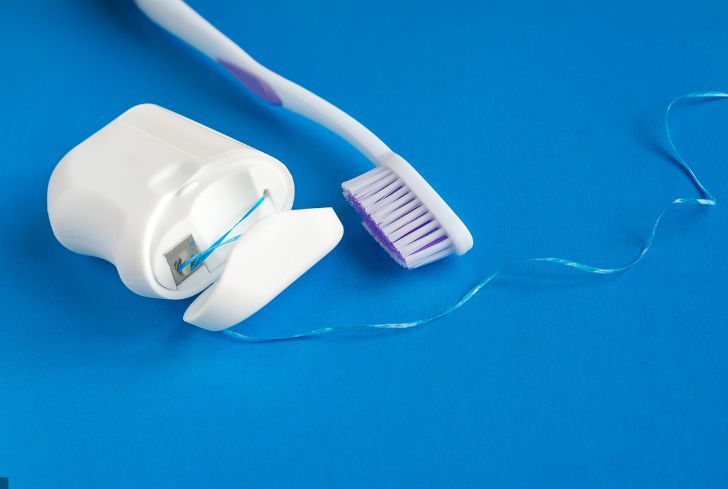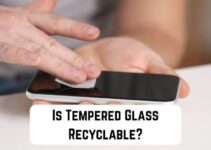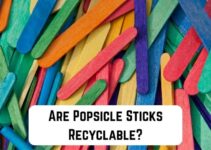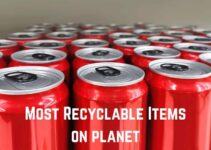When you decide to take your oral hygiene more seriously, one of the things you may find yourself burning through frequently is floss. You need this string to clean the areas around the gum and the spaces between the teeth. This is a preventive or curative measure for conditions like halitosis and plaque.
The American Dental Association recommends flossing once daily to reduce the chances of contracting cavities or gum disease. If you don’t remove plaque from the spaces in your teeth, it hardens and becomes tartar, a more technical form of bacteria.
The importance of flossing daily goes on and on. And now that many people are starting to take this aspect of hygiene seriously, you may wonder if this item is recyclable. What is the most environmentally friendly and uniformly acceptable method of disposing of dental floss?
Is Dental Floss Recyclable?
This is a resounding no. Floss is made from nylon, a by-product of crude oil, but it is so minuscule that recycling it would be a wasted effort. Think about the large recycling machines that destroy stronger and more significant waste materials like aluminum and glass.
It seems challenging to envision a similar device focusing on more minor items like floss.
Furthermore, the string is coated with a synthetic wax, and the wax will not break down properly in the recycle bin. Floss is not a cost-effective material to recycle because of its minuscule size.
Dental floss is made from nylon and other materials, including synthetic wax. It is also a form of plastic made from petrochemicals. Teflon is another popular material used to make floss, but it still is not recyclable.
This is not because Teflon is not recyclable but because floss is too tiny to go through a recycling machine reasonably. So, you have to throw it in the trash can.
We say the trash can because flushing floss down the toilet is a bad idea. The little strings are strong enough to collect dirt and debris from the septic pipes, and you can guess what happens when a large chunk forms.
It can lead to a blockage of your pipes.
Throw used floss in the trash can, or start looking into more eco-friendly choices. Some alternatives biodegrade when bacteria come in contact with them, which is better than polluting the ecosystem for several decades.
Can You Recycle Floss Picks?
No, you cannot recycle floss picks because it is not a single material but instead combines two products – nylon and plastic. You cannot recycle conventional dental floss also due to its small size. Dental floss has been specially compressed to smaller pieces for ease of use, but it is much too little for any recycling center to take on.
Dental floss picks come in boxes that you can recycle, depending on local and municipal recycling guidelines.
However, floss picks cannot be recycled because of the combination of materials – wax, nylon, and plastic. If these three items are recycled together, the result will be useless material.
So, the best bet is to put your floss picks in the trash can. They will inevitably end up in our landfills, and since the primary material is plastic, albeit in different versions, floss picks will remain there indefinitely.
Plastic requires twenty to fifty years for decomposition to happen. This doesn’t happen like the conventional biodegradation process. Instead, UV rays melt the plastic string and its casing, but it takes a long time.
Can you recycle dental floss picks? No; it is a desirable action for anyone that’s environmentally conscious, but recycling this waste product isn’t cost-effective. At the end of the day, we may consume even more energy, so it may be better to put your floss picks in the trash can.
Reusing is not an alternative because this is a hygiene product, so it is better to use it once and throw it out.
Alternatively, you can choose brands that produce dental floss picks with biodegradable or natural materials.
Are Disposable Flossers Recyclable?
No, disposable flossers are not recyclable. They are hygiene products made from Teflon, nylon, plastic, and wax. Moreover, combining these materials is not the only reason disposable flossers are unideal in a recycling machine.
It is also a cost-ineffective measure, considering that flossers are minuscule and many batches and tons would need to be recycled to ensure production- and profit-maximization.
Disposable flossers are popular commodities in the market today. And they shouldn’t be reused because of dental concerns. The essence of flossing is to remove plaque from your teeth and gums; reusing a disposable flosser defeats that purpose.
Therefore, you must throw it in the trash can after use. Disposable flossers are single-use items that we cannot recycle for solid reasons.
The fight to rescue the environment from ruin is on, and many industrial giants are on the side of the green movement. However, recycling some items isn’t possible yet, because the technology is not on the ground yet, or the cost of this process is not profitable.
Disposable flossers are miniature items, so they will likely get stuck in the intricate parts of the recycling machine, causing damage that may cost thousands of dollars.
Is Dental Floss Bad for the Environment?
Yes, dental floss is very bad for the environment. Unless you are flossing with biodegradable options, the results of your oral hygiene habits can result in pollution that never goes away. Plastic is one of the significant materials that are capable of causing an unending cycle of pollution.
Dental floss is made from Teflon, nylon, and other petroleum by-products. This makes it easy for the string to glide back and forth around the spaces in your teeth, cleaning out plaque effectively. There are other eco-friendly alternatives now, but before the world knew about them, we may have invariably wreaked a degree of havoc on the environment.
The concept of nanoplastics is newly emerging; it turns out that there are even worse effects of the decomposition process of plastics.
Dental floss will not break down fast, and microbes do not affect it. However, the sun’s rays will beat it to pieces with time. These pieces are a huge environmental concern in the form of nanoplastics.
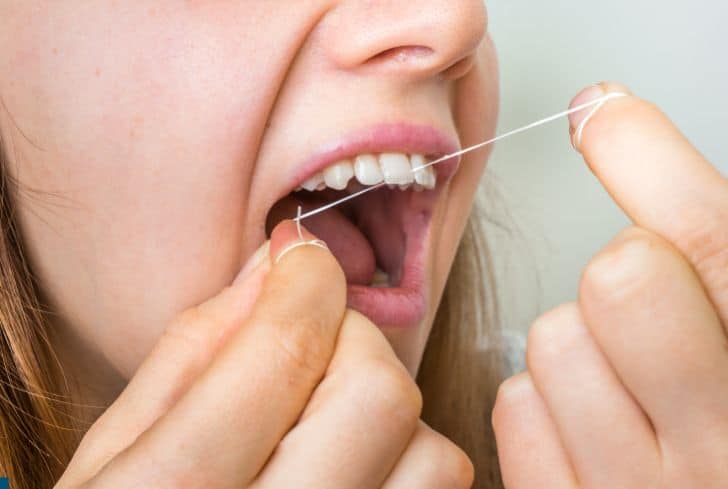
We cannot see them with our bare eyes; they are even smaller than microplastic and just as hazardous.
Get this – a single plastic bag can break into a million microplastics. Those microplastics break down into even smaller pieces that we cannot see.
Since we cannot recycle it, you may think flushing it down the toilet is the next best idea.
Well, we advise against this because the string can clog your pipes. It can gather dirt while traveling through the sewage, and before it arrives at its destination, there may be a clump that causes a blockage.
Of course, you cannot flush it down the toilet if it is a dental floss pick. It would have to end up in the landfill, slowly decomposing and polluting the environment. Biodegradable options are much better.
Does Dental Floss End Up in Landfills?
Yes, dental floss ends up in landfills. That is the best and possibly only suitable place for it. The best you can do for the environment after using nonbiodegradable floss is to throw it in the trash can. It will end up in the landfill, but at least that is a uniform method of disposing of waste.
There is no other place dental floss can end up apart from the landfill. This is the best option even.
If you throw it into the toilet bowl and flush it, it can clog your pipes. Scratch that – it will eventually clog your pipes, especially if you make it a habit. You cannot put it in your compost pile because it is not biodegradable.
And if you dispose of it without care, clueless biodiversity like squirrels and other small animals can choke on it. This is a linear foreign object that can cause an intestinal blockage and eventually cause death in an animal that ingests it.
Suffice it to say, albeit, with less enthusiasm, the landfill is the most suitable place for dental floss.
How Long Does Dental Floss Take to Decompose?
Dental floss is a plastic-based product. This is problematic because plastic doesn’t biodegrade. It does degrade, though, because it cannot withstand the sun’s harsh rays forever.
Plastic is a severe pollutant the environment is faced with, and this material doesn’t like to go away completely. It leaves the tiniest pieces of itself in the form of microplastics.
But before an item like dental floss degrades to the size of microplastics, it will take long years. Plastic can take up to a thousand years to become microplastics, and it can happen in fifty years.
Biodegradation or degradation happens based on many factors, primarily environmental. Plastic breaks down faster when there is direct exposure to sunlight coupled with harsher weather.
The size of the item also matters. Since it is something as small as a string of nylon encased in a small casing, it will break down faster. However, there is no way to tell how long it would take.
That is not the problem, though. We must also consider the effects of living with that amount of plastics. Plastics are manufactured materials that threaten the safety of biodiversity.
It does not decompose fast enough, and its biodegradation process seethes some harmful chemicals into the area where it is, affecting biodiversity. And we can’t say floss truly decomposes; it only breaks down into smaller particles to further terrorize the environment.
How long does dental floss take to biodegrade? Too long; because it never entirely happens.
Instead, it breaks down into smaller pieces called nano plastics which easily travel around the globe.
What Can You Do with Old Dental Floss?
Throw it out. That is the best thing you can do with old dental floss; picks or strings alone. They should go in the trash can; they will end up in landfills, but at least there would be uniform disposal and fewer chances of disrupting the ecosystem.
A landfill is filled with unwanted waste items that we cannot recycle, so floss also belongs there.
As for the packaging it comes in, you should consider recycling it if it is made from plastic or glass.
Conclusion
Can you recycle dental floss? Sadly, you cannot. If you are concerned about the environment as you should be, you should consider biodegradable oral hygiene choices. You don’t even have to use floss; there are alternatives like wood toothpicks or biodegradable floss.
Floss is a commodity that you will use a large amount of, and that can be a great way to play your part in the fight to save the environment. More sustainable alternatives don’t deplete our non-renewable natural resources, and neither do they endanger biodiversity. We challenge you to find that brand without delay!
